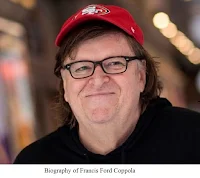Biography of Francis Ford Coppola:
Francis Ford Coppola is an American film director, producer, and screenwriter who is widely regarded as one of the greatest filmmakers in the history of cinema. Born on April 7, 1939, in Detroit, Michigan, Coppola has had a significant impact on the film industry with his influential works spanning several decades.
 |
| Biography of Francis Ford Coppola |
Key Points in Francis Ford Coppola's Biography:
1. Early Life of Francis Ford Coppola:
Francis Ford Coppola was born into an Italian-American family. His father, Carmine Coppola, was a composer, and his mother, Italia Coppola, was an actress.
He showed an early interest in the arts and filmmaking.
2. Francis Ford Coppola's Film School and Early Career:
Coppola attended the University of California, Los Angeles (UCLA) film school, where he studied under influential film historian and theorist Jean Mitry.
He began his career working in low-budget films, writing and directing features such as "Dementia 13" (1963) and "You're a Big Boy Now" (1966).
3. Breakthrough with "The Godfather":
Coppola achieved widespread recognition with the adaptation of Mario Puzo's novel, "The Godfather" (1972). The film, which he directed and co-wrote, became a critical and commercial success, winning three Academy Awards, including Best Picture.
4. "The Godfather Part II" and Success:
Coppola followed up with "The Godfather Part II" (1974), which was both a critical and commercial success. The film won six Academy Awards, including Best Director for Coppola.
The two "Godfather" films are often regarded as among the greatest in cinematic history.
5. Auteur Filmmaking and The Conversation:
Coppola established himself as an auteur filmmaker, known for his distinct vision and personal involvement in the creative process.
He directed "The Conversation" (1974), a psychological thriller that earned him the Palme d'Or at the Cannes Film Festival.
6. "Apocalypse Now":
"Apocalypse Now" (1979), a Vietnam War epic inspired by Joseph Conrad's "Heart of Darkness," is another landmark film in Coppola's career. The production faced numerous challenges but resulted in a visually stunning and thematically complex work.
7. Zoetrope Studios and Financial Struggles of Francis Ford Coppola:
Coppola co-founded Zoetrope Studios in the 1970s as a creative haven for filmmakers. However, the studio faced financial difficulties, and Coppola encountered personal financial challenges.
8. Later Career:
Coppola directed a diverse range of films in the subsequent decades, including "Rumble Fish" (1983), "The Cotton Club" (1984), "Bram Stoker's Dracula" (1992), and "The Rainmaker" (1997).
While some of his films received mixed reviews, others were critically acclaimed.
9. Winemaking Ventures:
In addition to filmmaking, Coppola is involved in the wine industry. He owns the Francis Ford Coppola Winery, which produces a variety of wines.
10. Personal Life of Francis Ford Coppola:
Coppola has been married to Eleanor Coppola since 1963, and they have three children who are also involved in the film industry, including filmmaker Sofia Coppola.
11. Honors and Awards:
Francis Ford Coppola has received numerous awards, including multiple Academy Awards, Golden Globes, and the Irving G. Thalberg Memorial Award.
12. Legacy:
Coppola's impact on cinema is immense, and he is often cited as a master filmmaker. His innovative approach to storytelling, visual style, and commitment to artistic expression have influenced generations of filmmakers.
Francis Ford Coppola's contributions to cinema, particularly with landmark films like "The Godfather" series and "Apocalypse Now," have left an enduring mark on the art of filmmaking. His willingness to take creative risks and his dedication to the craft have solidified his place as one of the most celebrated directors in the history of cinema.